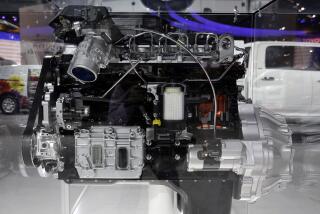Jury Decides in Favor of Unocal in Gasoline Patent Suit
A U.S. District Court jury handed Unocal Corp. a potentially lucrative victory Tuesday that may prove costly to California motorists, finding that six of the nation’s biggest oil companies violated a Unocal patent for cleaner-burning gasoline.
The Los Angeles jury ruled that Unocal holds a valid patent on nearly one-third of the gasoline that California service stations have been selling for more than a year under state clean-air mandates.
The ruling could translate into tens of millions of dollars in annual royalties to Unocal, a sum that is sure to find its way into the price that California motorists pay at the pump. Estimates of the impact have ranged as high as 7 cents a gallon.
That will be determined in the next phase of the trial, which begins in a few days, when Unocal will present its case for damages. In the third phase, U.S. District Judge Kim McLane Wardlaw will determine if the patent is enforceable.
The jury, which deliberated for 13 days, determined that 29% of the gasoline produced by the six other oil companies in California during a five-month period, or nearly 1.2-billion gallons, was in violation of the patent held by Unocal since 1994.
The jury ruled against Atlantic Richfield Co., Chevron USA Inc., Exxon Corp., Mobil Oil Corp., Shell Oil Products Co. and Texaco Refining & Marketing Inc.
If current production matches the roughly 240,000 gallons per month that the jury found violated the Unocal patent during that 1996 period, then nearly 2.9 billion gallons a year might be subject to a royalty fee that oil industry analysts have speculated might range between 1 cent and 7 cents a gallon. Nearly 13 billion gallons of gasoline are sold in California each year.
If Unocal got only one penny per gallon, it would receive about $28 million a year. Seven cents per gallon would bring nearly $202 million a year. It was not clear whether the several California refiners not involved in the lawsuit also produce gasoline covered by the Unocal patent.
Spokesmen for Arco and Chevron said they were disappointed with the verdict and reiterated their contention that the patent is invalid. The six companies have the option of appeal.
“We continue to believe that the patent is invalid,” Arco spokesman Al Greenstein said. “We also believe Unocal operated in an unfair and improper manner in obtaining the patent and should not be awarded any royalties.”
The six Unocal competitors filed suit two years ago to invalidate Unocal’s patent, contending that the patent was too broad and that it was based on information that was already well known in the industry. Unocal countersued.
“We are extremely pleased with the jury decision today that upholds our patent claims and finds that the six defendants have infringed on that patent,” Unocal said in a statement. “This is a proper decision based on the evidence.”
In trading before the verdict was announced, Unocal shares slipped 25 cents to close at $44 on the New York Stock Exchange.
Unocal and its six adversaries were once allies in the quest to find a cleaner-burning gasoline that would meet the tough standards of the California Air Resources Board, forming an industry coalition in 1989.
Unocal said that it began research months earlier that led to the patent request in 1990. But the six other companies said that Unocal got the patent using information that the companies shared and that the patent was not “new and non-obvious” as required by law.
In the meantime, Unocal has gotten out of the oil-refining and gasoline retail businesses (though the gasoline stations still display the Unocal name and familiar orange ball). But although it sold its other patents, the company retained the one in dispute. Unocal, which earned $456 million from operations last year, now focuses on overseas crude oil production and exploration in places such as Thailand and Myanmar.
The patent lawsuit, which went to trial July 15, generated 39 volumes of court filings crammed with esoteric scientific formulas.
Unocal has never said what it plans to demand in royalties. But just as the higher cost of producing reformulated gasoline has been largely passed on to consumers, so would most of any royalty that refiners end up paying, analysts have predicted.
More to Read
Inside the business of entertainment
The Wide Shot brings you news, analysis and insights on everything from streaming wars to production — and what it all means for the future.
You may occasionally receive promotional content from the Los Angeles Times.










